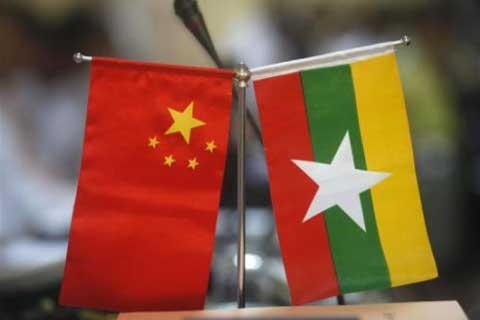Closer Look: China Still Has Strong Ties to Myanmar despite Rocky Period

(Beijing) – Relations between Myanmar and China remain tense after a bomb from a Myanmar military plane fell in the southwestern province of Yunnan on March 13, killing four people and injuring nine.
China responded to the incident by summoning Myanmar's ambassador to condemn the incident. It also urged Myanmar's government to thoroughly investigate and take measures to prevent a similar incident from happening again.
The vice chairman of China's Central Military Commission, Fan Changlong, called the commander of Myanmar's defense forces to urge him to rein in the military. He also warned that "China will take decisive action to protect its people's lives and property."
Myanmar's government, which has promised to cooperate with China in the investigation of the incident, blames the Myanmar National Democratic Alliance Army (MNDAA), a rebel army in the northeastern Kokang region led by Pheung Kya-shin. It accuses the MNDAA of trying to sabotage Sino-Myanmar relations.
This isn't the first time the fighting in northern Myanmar has spilled over into China. Over the past two decades, China has acted as a mediator in the conflicts between the Kachin Independence Army, another rebel group in northern Myanmar, and Myanmar's forces, trying to safeguard peace and stability along the border.
The two neighbors also have important economic and trade ties. Before Myanmar's first popularly elected government came to power in 2011, China was Myanmar's longest and closest friend in the eyes of the West. Ties were particularly close during the nearly 20 years of sanctions that the West, except for Japan, imposed starting in the mid-1990s as a way to protest Myanmar's then military-led government, which repressed the country's democratic movements.
When Thein Sein, Myanmar's first civilian-elected president, was interviewed by Chinese newspapers in 2012, he said his country should thank China because when it suffered an economic blockade Beijing provided timely loans.
As data from the Myanmar government show, before the new administration took power in July 2011, more than 40 percent of the country's foreign capital came from China. From April 2011 to March 2012, China was Myanmar's biggest trade partner, with bilateral trade of about US$ 5 billion, three times more than its combined trade with Japan and South Korea.
Now, though, the once-close trade links are changing. Myanmar's government is embarking on a series of economic and political reforms, diversifying its diplomatic relations and trade by increasingly looking to the West.
It's not difficult to detect the signs of change. For instance, Thein Sein has said that in order to respect public opinion, the Myitsone dam project on the Irrawaddy River, valued at nearly US$ 4 billion and funded by China, would be suspended. It was a shrewd move directed at public opinion and is deemed a milestone in Myanmar's reform as well as an indication of souring relations between the two partners.
Since then, media have reported problems with numerous Chinese projects, and overall Chinese investment has reportedly plummeted.
Europe and the United States, in the meantime, are boosting their relationships with the country and exploring business opportunities there. In 2011, U.S.-Myanmar trade expanded for the first time in a decade, up to US$ 300 million. Even though the United States has not lifted all sanctions against Myanmar, it is gradually easing them. The European Union, for its part, decided in 2013 to permanently abandon, except for a military embargo, all sanctions against Myanmar and its officials.
On top of all that, U.S. President Barack Obama has visited Myanmar twice. Thein Sein, in turn, has made trips to the West, including to the United States and Germany, to attract investment.
Myanmar's media has reported that the country, since halting the Chinese dam project, has switched toward Britain, France and Norway, seeking cooperation with renowned multinational firms with good quality equipment and strong capital for its new hydropower projects.
Economic ties have also improved with Japan. Some Myanmar officials predicted that in the 2014-2015 fiscal year Japan will become the country's largest investor.
However, David Steinberg, a Myanmar expert at Georgetown University, said Japan is unlikely to catch up to China, which remains Myanmar's top investor and trade partner. Steinberg also said that rapprochement with India and the West will help Myanmar return to a more even footing instead of living under China's shadow.
Before the bombing incident, China had already foreseen the transition in relations and the challenges the two countries would face. When Thein Sein attended the 2013 Boao Forum in China, China's ambassador to Myanmar, Yang Houlan, said that an increasing number of multinational companies would soon enter the country and that competition would grow much more fierce.
Myanmar, nevertheless, continues to prioritize its ties with China, even if domestically there has been some anti-China sentiment in recent years. Last year, Myanmar took the rotating chair of the Association of Southeast Asian Nations. When interviewed by media, a diplomat from Myanmar said that the country would not change its active, independent and non-aligned foreign policy and that it wished to maintain peaceful relations with all countries, China in particular.
(Rewritten by Han Wei)
- MOST POPULAR







